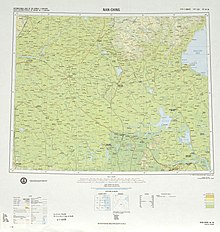Liao-ch'eng
Appearance
See also: Liaocheng
English
[edit]
Etymology
[edit]From Mandarin 聊城 (Liáochéng), Wade–Giles romanization: Liao²-chʻêng².
Proper noun
[edit]Liao-ch'eng
- Alternative form of Liaocheng.
- [1944, Hiromu Momose, “YANG I-tsêng 楊以增”, in Arthur W. Hummel, Sr., editor, Eminent Chinese of the Ch'ing Period (1644-1912), volume II, →ISBN, →OCLC, →OL, page 888, column 1:
- YANG I-tsêng 楊以增 (T. 益之, 至堂, 東樵), Oct. 26, 1787-1856, Jan. 25, official and bibliophile, was a native of Liao-chʻêng, Shantung.]
- 1989, Yoshikawa Kōjirō, translated by John Timothy Wixted, Five Hundred Years of Chinese Poetry, 1150-1650[2], Lawrenceville, NJ: Princeton University Press, →ISBN, →LCCN, →OCLC, page 35:
- The following five-character regulated verse, one of two entitled "Twelfth Month, Sixth Day,"²⁸ was written by Yuan Hao-wen while under house arrest in Liao-chʻeng.
The empire still full of arms,
At this edge of the world, the year again renewed.
The dragon has shifted, leaving fish and turtles lost;
The sun eclipsed, unicorns are fighting.
Brambles amid grasses, these desolate hills are snowy;
In my old garden, mist and flowers mark the spring.
Here in Liao-chʻeng, a moon out tonight,
I feel disconsolate still away from home.
Translations
[edit]Liaocheng — see Liaocheng
